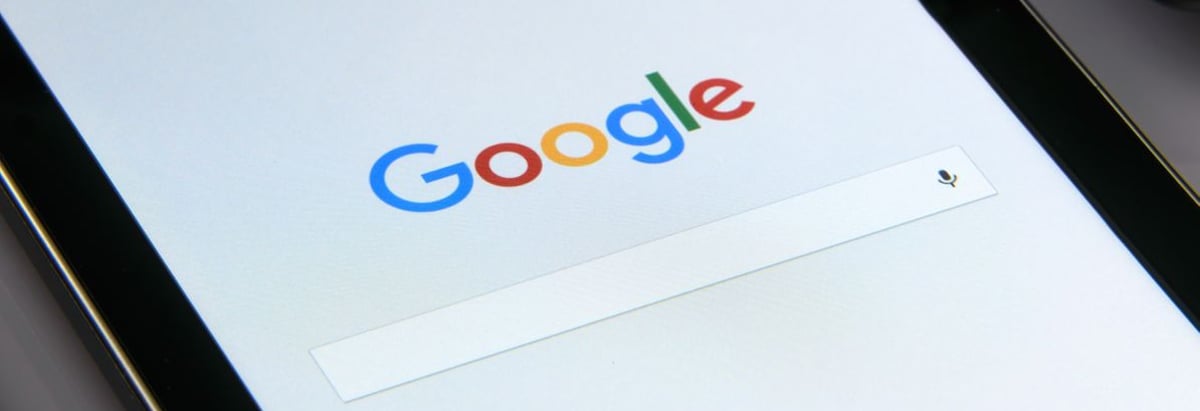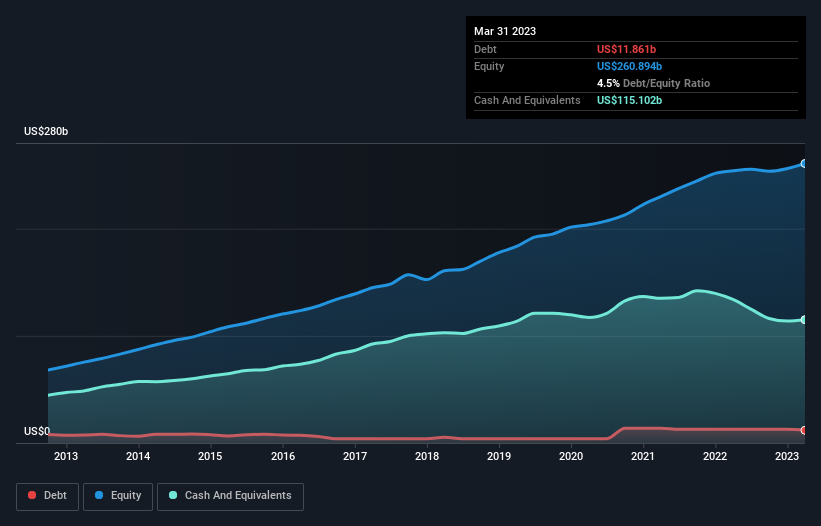- United States
- /
- Interactive Media and Services
- /
- NasdaqGS:GOOGL
Here's Why Alphabet (NASDAQ:GOOGL) Can Manage Its Debt Responsibly

David Iben put it well when he said, 'Volatility is not a risk we care about. What we care about is avoiding the permanent loss of capital.' It's only natural to consider a company's balance sheet when you examine how risky it is, since debt is often involved when a business collapses. As with many other companies Alphabet Inc. (NASDAQ:GOOGL) makes use of debt. But the real question is whether this debt is making the company risky.
When Is Debt Dangerous?
Debt assists a business until the business has trouble paying it off, either with new capital or with free cash flow. Ultimately, if the company can't fulfill its legal obligations to repay debt, shareholders could walk away with nothing. However, a more common (but still painful) scenario is that it has to raise new equity capital at a low price, thus permanently diluting shareholders. Of course, plenty of companies use debt to fund growth, without any negative consequences. The first thing to do when considering how much debt a business uses is to look at its cash and debt together.
See our latest analysis for Alphabet
What Is Alphabet's Debt?
You can click the graphic below for the historical numbers, but it shows that Alphabet had US$11.9b of debt in March 2023, down from US$12.8b, one year before. However, it does have US$115.1b in cash offsetting this, leading to net cash of US$103.2b.

A Look At Alphabet's Liabilities
Zooming in on the latest balance sheet data, we can see that Alphabet had liabilities of US$68.9b due within 12 months and liabilities of US$39.7b due beyond that. On the other hand, it had cash of US$115.1b and US$36.0b worth of receivables due within a year. So it actually has US$42.5b more liquid assets than total liabilities.
This short term liquidity is a sign that Alphabet could probably pay off its debt with ease, as its balance sheet is far from stretched. Simply put, the fact that Alphabet has more cash than debt is arguably a good indication that it can manage its debt safely.
On the other hand, Alphabet's EBIT dived 12%, over the last year. We think hat kind of performance, if repeated frequently, could well lead to difficulties for the stock. There's no doubt that we learn most about debt from the balance sheet. But ultimately the future profitability of the business will decide if Alphabet can strengthen its balance sheet over time. So if you're focused on the future you can check out this free report showing analyst profit forecasts.
But our final consideration is also important, because a company cannot pay debt with paper profits; it needs cold hard cash. Alphabet may have net cash on the balance sheet, but it is still interesting to look at how well the business converts its earnings before interest and tax (EBIT) to free cash flow, because that will influence both its need for, and its capacity to manage debt. During the last three years, Alphabet generated free cash flow amounting to a very robust 89% of its EBIT, more than we'd expect. That puts it in a very strong position to pay down debt.
Summing Up
While we empathize with investors who find debt concerning, you should keep in mind that Alphabet has net cash of US$103.2b, as well as more liquid assets than liabilities. And it impressed us with free cash flow of US$62b, being 89% of its EBIT. So is Alphabet's debt a risk? It doesn't seem so to us. Above most other metrics, we think its important to track how fast earnings per share is growing, if at all. If you've also come to that realization, you're in luck, because today you can view this interactive graph of Alphabet's earnings per share history for free.
Of course, if you're the type of investor who prefers buying stocks without the burden of debt, then don't hesitate to discover our exclusive list of net cash growth stocks, today.
If you're looking to trade Alphabet, open an account with the lowest-cost platform trusted by professionals, Interactive Brokers.
With clients in over 200 countries and territories, and access to 160 markets, IBKR lets you trade stocks, options, futures, forex, bonds and funds from a single integrated account.
Enjoy no hidden fees, no account minimums, and FX conversion rates as low as 0.03%, far better than what most brokers offer.
Sponsored ContentNew: Manage All Your Stock Portfolios in One Place
We've created the ultimate portfolio companion for stock investors, and it's free.
• Connect an unlimited number of Portfolios and see your total in one currency
• Be alerted to new Warning Signs or Risks via email or mobile
• Track the Fair Value of your stocks
Have feedback on this article? Concerned about the content? Get in touch with us directly. Alternatively, email editorial-team (at) simplywallst.com.
This article by Simply Wall St is general in nature. We provide commentary based on historical data and analyst forecasts only using an unbiased methodology and our articles are not intended to be financial advice. It does not constitute a recommendation to buy or sell any stock, and does not take account of your objectives, or your financial situation. We aim to bring you long-term focused analysis driven by fundamental data. Note that our analysis may not factor in the latest price-sensitive company announcements or qualitative material. Simply Wall St has no position in any stocks mentioned.
About NasdaqGS:GOOGL
Alphabet
Offers various products and platforms in the United States, Europe, the Middle East, Africa, the Asia-Pacific, Canada, and Latin America.
Very undervalued with outstanding track record.
Similar Companies
Market Insights
Community Narratives



